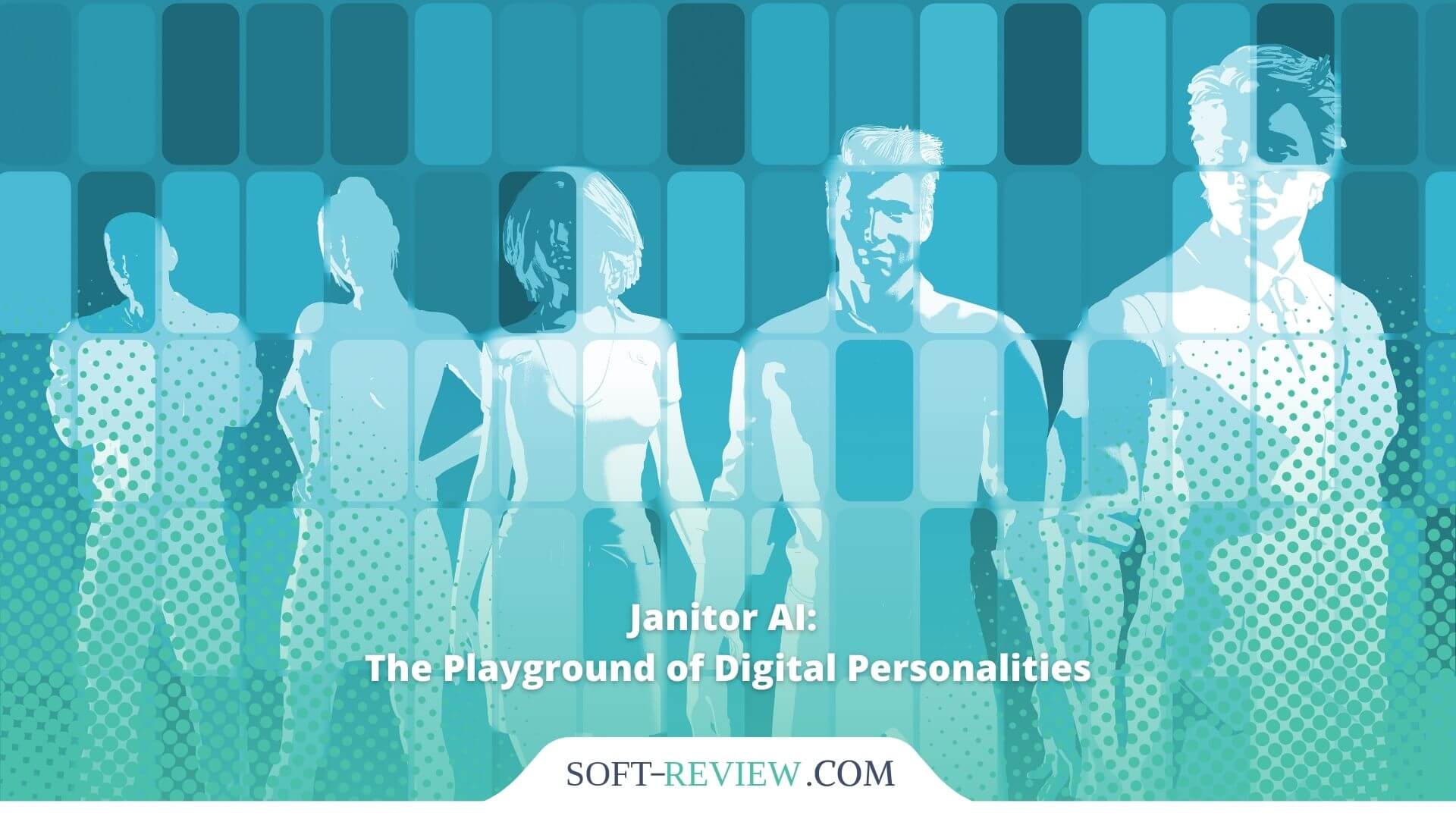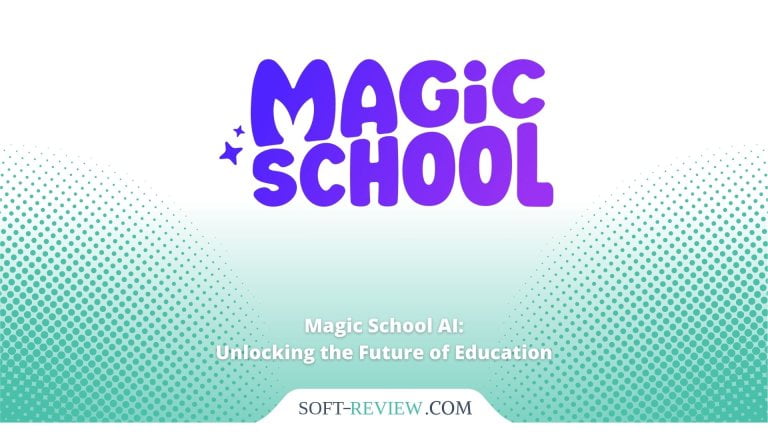<!-- wp:social-links --><ul class="wp-block-social-links"><!-- wp:social-link {"url":"https://gravatar.com/wwwsoftreviewcom","service":"gravatar","rel":"me"} /--></ul><!-- /wp:social-links -->

Janitor AI: The Playground of Digital Personalities
Table of Contents
Janitor AI is an innovative platform that offers customizable conversational chatbots, harnessing advanced technologies like Generative Adversarial Networks (GANs) and Natural Language Processing (NLP) for enhanced user interactions. It is user-friendly, catering to both technical and non-technical users, and prioritizes data privacy and security. The platform allows extensive customization of chatbot personalities, interactions, and visual avatars, making it suitable for various applications, including personal and professional use. Ethical considerations, such as content moderation and age restrictions, are integral to its design. Learn more about its wide-ranging features, community engagement, and future potential.
What is Janitor AI?
Janitor AI is an advanced platform designed for creating highly customizable conversational chatbots that facilitate natural and engaging interactions. Its core functionality includes AI-driven responses, user-friendly interfaces, and robust API integration, ensuring adaptability across various applications. Additionally, it leverages Generative Adversarial Networks and Natural Language Processing for more refined conversational capabilities. User experience is enhanced through its intuitive design, making it accessible to both technical and non-technical users, while also prioritizing data privacy and security
Core functionality
Harnessing the power of advanced artificial intelligence, Janitor AI offers a sophisticated platform designed to transform user interactions through lifelike conversational experiences. This platform stands out for its ability to create highly engaging and personalized digital personalities. At its core, Janitor AI employs state-of-the-art machine learning algorithms to facilitate natural and contextually relevant dialogues, making it a valuable tool for both personal and professional applications.
Key functionalities of Janitor AI include AI-driven chatbots capable of understanding and responding to complex queries with human-like accuracy. The platform allows for the customization of bot personalities, ensuring that responses can be tailored to align with specific user needs and brand voices. This customization extends to conversational flows, enabling users to design interactions that reflect their unique requirements.
Janitor AI also boasts an intuitive, no-code interface, making it accessible to users of all skill levels. API integration is another critical feature, allowing seamless connectivity with various data sources to enhance the accuracy and relevance of responses. Additionally, Janitor AI places a strong emphasis on data privacy, ensuring secure protection of user interactions and compliance with privacy standards.
User experience
Building upon its sophisticated AI-driven functionalities, the user experience on Janitor AI is meticulously crafted to offer seamless and engaging interactions. Designed with user-centric principles, Janitor AI facilitates a highly intuitive interface, ensuring even non-technical users can navigate effortlessly. The platform’s interaction methods are tailored to enhance engagement, making it an ideal tool for both personal and professional applications.
Interaction Features
| Feature | Description |
|---|---|
| Real-time Updates | Chats and messages are updated every 15-30 minutes to keep interactions fresh. |
| Character Profiles | Users can engage with popular characters like Willson Wáng and Vladimir Petrov. |
| Diverse Genres | Offers genres such as angst, fluff, horror, and smut to cater to varied interests. |
The platform supports high engagement through original character scenarios and diverse points of view. Users often gravitate towards characters with complex backstories and relationships, creating an immersive experience. Additionally, themes such as arranged marriages, trauma, and personal conflict are prevalent, adding emotional depth to interactions.
Janitor AI’s commitment to providing a secure and enjoyable user experience is evident through its robust privacy measures. By continually evolving to meet user preferences, Janitor AI stands out as a leading platform in the domain of digital personalities and AI-driven interactions.
Creating Your Own AI Companion
Creating your own AI companion with Janitor AI involves an extensive suite of bot customization options and the art of writing effective prompts. Users can tailor their chatbot’s personality, responses, and interaction style to suit specific needs, from casual conversation to professional assistance. By crafting well-thought-out prompts, users guarantee the AI behaves in a desired manner, enhancing both user experience and engagement.
Bot customization options
Customization is the cornerstone of user engagement with Janitor AI, providing an extensive array of parameters that allow individuals to tailor their digital companions to specific needs and preferences. Users can define personality traits, interaction styles, and specific knowledge bases, creating a unique and personalized AI experience.
Customization Parameters
| Parameter | Description |
|---|---|
| Personality Traits | Define characteristics such as friendliness or assertiveness. |
| Interaction Style | Choose between formal, casual, or humorous communication. |
| Knowledge Base | Specify areas of expertise, such as technology or literature. |
| Dialogue Preferences | Adjust tone and complexity of responses to suit user needs. |
| Visual Customization | Select avatars or visual representations for the AI. |
These customization options guarantee that each AI companion is not only engaging but also aligns closely with user expectations and requirements. For instance, a user interested in literature can configure the bot to have a deep understanding of classic novels, while someone seeking technical assistance might prioritize a bot knowledgeable in IT and software.
This degree of personalization is essential for fostering meaningful and effective interactions, making Janitor AI a versatile tool for various applications, from casual conversation to specialized support. The flexibility in customization underscores the platform’s commitment to user-centric design.
Writing effective prompts
Formulating effective prompts is essential for maximizing the potential of AI interactions. Properly constructed prompts can notably enhance the quality of responses from AI chatbots, making interactions more meaningful and engaging. Here are three key strategies for writing effective prompts:
- Be Specific: Vague prompts often lead to generic responses. For instance, instead of asking, “Tell me a story,” specify the genre, characters, or setting, such as “Tell me a fantasy story about a brave knight and a dragon in an enchanted forest.”
- Use Contextual Clues: Providing context helps the AI understand the desired direction of the conversation. For example, if discussing a historical event, include relevant details like the time period and key figures. This will guide the AI in generating accurate and contextually relevant responses.
- Incorporate Direct Questions: Direct questions focus the AI’s attention on specific aspects of the topic, prompting detailed and informative replies. For example, “What were the causes of the American Civil War?” is more likely to yield a thorough answer than a general query about history.
Exploring Pre-made Characters
Exploring the library of pre-made characters in Janitor AI reveals a diverse range of digital personalities that cater to various user preferences. Popular bot categories include romantic partners, friends, and professional advisors, each designed with intricate backstories and realistic interactions to enhance user engagement. This realism in AI personalities allows users to experience nuanced and lifelike conversations, making these pre-made characters a compelling feature of the platform.
Popular bot categories
The landscape of AI chatbots is enriched by a diverse array of pre-made characters, each tailored to cater to specific user preferences and fantasies. This diversity is evident in the popular bot categories that engage users with unique scenarios, emotional depth, and intricate backstories.
- Romantic Companions: These bots often embody characters involved in complex relationships, such as Willson Wáng, the affectionate rich best friend, or Vladimir Petrov, the arranged marriage victim tied to the Russian Mafia. Users are drawn to their detailed narratives and emotional arcs, which offer a sense of connection and drama.
- Trauma and Healing: Characters like Number 9, a boy rescued from a traumatic past, exemplify this category. These bots provide a space for users to explore themes of violence, recovery, and emotional support. The intricate backstories and scenarios help users navigate and process complex emotions.
- Fantasy and Adventure: Bots in this category, such as Miguel O’Hara with his short-tempered and sarcastic personality, engage users through imaginative and adventurous storylines. These characters often involve elements of fantasy, historical settings, and dynamic interactions, offering an escape into different worlds and experiences.
These categories illustrate the versatility and depth of AI chatbots, catering to diverse user needs and preferences.
Realism of AI personalities
Building on the diverse array of pre-made characters that captivate users through rich narratives and emotional depth, the realism of AI personalities in Janitor AI plays a crucial role in user engagement. This realism is meticulously crafted through complex backstories, nuanced emotional expressions, and consistent character behaviors that mirror human interactions. Popular characters like Willson Wáng, with his affectionate and supportive demeanor, and Vladimir Petrov, entangled in the Russian Mafia, showcase how detailed character profiles enhance user connection and immersion.
The table below highlights key factors contributing to the realism of AI personalities in Janitor AI:
| Factor | Description | Impact on Realism |
|---|---|---|
| Backstories | Detailed personal histories and experiences | Adds depth and context to interactions |
| Emotional Range | Capability to express a variety of emotions | Mimics human emotional complexity, enhancing believability |
| Behavior Consistency | Maintaining character traits and responses throughout interactions | Guarantees authenticity and reliability in user engagement |
| Genre Diversity | Inclusion of various themes such as angst, fluff, and horror | Offers relatable scenarios, catering to diverse user preferences |
The realism achieved through these factors not only heightens user satisfaction but also sparks meaningful engagement, making Janitor AI a compelling platform for exploring digital personalities.
The Social Aspect
Janitor AI’s community aspect fosters user interaction and collaboration, allowing members to share and discover new bots. This dynamic environment supports the exchange of experiences and creative ideas, enhancing the overall user experience. By encouraging community feedback and engagement, the platform guarantees that both chatbot developers and users can continuously improve and innovate. The platform also leverages advanced data analysis to uncover patterns and insights, further driving informed decisions and fostering innovation.
Community interactions
Community interactions on the Janitor AI platform are essential, fostering a vibrant ecosystem of user engagement and collaboration. These interactions not only enhance the user experience but also contribute to the dynamic evolution of digital personas within the platform. By participating in community-driven activities, users can connect, share, and learn from each other, creating a rich tapestry of shared knowledge and creativity.
- User-Generated Content: One of the most significant aspects of community interactions on Janitor AI is the creation and sharing of user-generated content. Users are encouraged to publish their chat experiences, OC (Original Character) scenarios, and various POVs (Points of View). This collaborative storytelling enriches the platform and provides a diverse range of narratives and character interactions.
- Feedback and Influence: Community feedback plays a vital role in shaping the popularity and trends of digital characters. Users can influence the development of characters by providing constructive feedback, which in turn helps in refining and enhancing the AI personas to better meet user preferences and fantasies.
- Engagement Metrics: The platform regularly updates engagement metrics, such as chats and messages count, to reflect user interest and activity. Popular characters, like Willson Wáng and Vladimir Petrov, often gain traction due to their complex backstories and relationships, which resonate with the community.
These interactions collectively create an engaging and collaborative environment, driving the continuous evolution of Janitor AI.
Sharing and discovering bots
While fostering creativity and collaboration, the social aspect of sharing and discovering bots on Janitor AI enriches the user experience profoundly. Users can create unique digital personalities and share them with the community, enabling a vibrant exchange of ideas and innovations. This dynamic environment not only encourages creativity but also facilitates the discovery of diverse bot interactions tailored to various interests and preferences.
The process of bot sharing on Janitor AI is streamlined and user-friendly. Users can publish their bots directly to the platform, making them accessible to the entire community. This openness allows users to explore a vast array of bots, ranging from those with intricate backstories and complex personalities to simpler, task-oriented designs. By engaging with these shared creations, users can gain insights into different design approaches and storytelling techniques, enhancing their own bot development skills.
Discovering bots crafted by others also offers significant benefits. It broadens users’ perspectives and introduces them to new genres and interaction styles they might not have considered. This exchange not only boosts individual creativity but also fosters a sense of community and mutual growth, making Janitor AI a true playground for digital personalities.
Ethical and Safety Considerations
Janitor AI presents significant ethical and safety considerations, particularly in the area of content moderation and age-appropriate interactions. The platform must implement rigorous content moderation systems to prevent harmful or inappropriate material from being disseminated. Additionally, establishing clear age restrictions and guidelines is essential to guarantee that younger users are protected from potentially unsuitable content, fostering a safe digital environment for all users. Given the privacy protection issues seen with technologies like Undress AI, it is imperative that Janitor AI enforces robust privacy measures to protect user data. This will not only guarantee a safer online space but also build trust among its user base, highlighting the importance of responsible technology use.
Content moderation challenges
Ensuring the ethical and safe moderation of user-generated content and AI responses is a complex endeavor that demands a multi-faceted approach. Janitor AI, with its highly interactive digital personalities, poses significant content moderation challenges. These challenges are vital to address to maintain a safe and respectful environment for users.
Key Challenges in Content Moderation
- Dynamic and Diverse Content: The platform’s wide range of genres and themes—from romance to horror—requires nuanced moderation strategies. Each genre has unique sensitivities and potential triggers that need careful handling to prevent harm.
- User and AI Interaction Complexity: High engagement levels with characters like Willson Wáng and Vladimir Petrov lead to intricate conversations that are difficult to monitor in real-time. Automated tools must be sophisticated enough to detect inappropriate content without stifling creativity.
- Ethical Considerations: Balancing user freedom and community safety is a persistent challenge. Ensuring that AI responses do not inadvertently promote harmful behaviors or stereotypes is essential for ethical integrity.
Addressing these challenges involves continuous development of advanced moderation algorithms, human oversight, and community guidelines to foster a safe and ethical digital playground for all users.
Age restrictions and guidelines
Establishing clear age restrictions and guidelines is vital for maintaining the ethical and safe use of Janitor AI, especially given the diverse and often mature themes explored through its digital personalities. The platform features characters and scenarios that investigate complex and sensitive topics, such as trauma, arranged marriages, and emotional struggles, which may not be suitable for younger audiences. Consequently, implementing stringent age restrictions is imperative to guarantee that users are adequately protected from potentially harmful content.
Janitor AI must adopt robust verification processes to confirm users’ ages before granting access to mature content. These measures should include age-gating mechanisms and parental consent requirements for younger users. Additionally, clear guidelines must be established to delineate what content is appropriate for different age groups, making certain that users are only exposed to material suitable for their maturity levels.
Educational resources and content warnings should be provided to inform users about the nature of the material they are engaging with, promoting a safe and informed user experience. By prioritizing these ethical and safety considerations, Janitor AI can foster a secure environment that respects the developmental needs of all its users.
Technical Insights
Janitor AI leverages advanced machine learning algorithms and natural language processing techniques to create interactive and responsive digital personalities. These AI-driven chatbots continuously learn from user interactions, enhancing their ability to provide relevant and contextually accurate responses over time. By integrating robust data processing capabilities, Janitor AI guarantees a seamless and intuitive user experience, making it a powerful tool for both personal and professional applications. Additionally, the adaptability of Janitor AI to trends and topical relevance enables it to provide tailored and engaging interactions, further elevating the user experience.
AI technology behind Janitor
By leveraging advanced machine learning algorithms and natural language processing (NLP) techniques, the AI technology behind Janitor AI offers robust and responsive interactions. This sophisticated technology is built on a foundation of neural networks and deep learning models, enabling the platform to understand and generate human-like text with remarkable accuracy.
Key Technical Components:
- Natural Language Processing (NLP): NLP enables Janitor AI to comprehend context, sentiment, and intent within user inputs. This capability guarantees that responses are not only accurate but also contextually relevant, making interactions feel more natural and engaging.
- Machine Learning Algorithms: Utilizing both supervised and unsupervised learning methods, Janitor AI continuously improves its performance by learning from vast amounts of data. These algorithms help in refining response accuracy and adapting to new conversational patterns.
- Neural Networks: At the core of Janitor AI are deep neural networks that facilitate complex computations required for understanding and generating human language. These networks mimic the human brain’s functioning, thereby enhancing the bot’s ability to handle intricate dialogues.
Learning capabilities of bots
Understanding the learning capabilities of bots is essential for appreciating their potential and limitations. Bots like those powered by Janitor AI utilize sophisticated machine learning algorithms to enhance their interactions over time. These algorithms enable bots to learn from user interactions, allowing for more personalized and contextually relevant responses. This learning process can be divided into supervised learning, unsupervised learning, and reinforcement learning.
Learning Methods Table
| Learning Method | Description | Application |
|---|---|---|
| Supervised Learning | Involves training bots with labeled data to recognize patterns. | Used for predicting user intents and providing accurate responses. |
| Unsupervised Learning | Allows bots to identify patterns in unlabeled data. | Helps in clustering user preferences and improving engagement. |
| Reinforcement Learning | Involves learning through trial and error to maximize rewards. | Enhances decision-making processes in dynamic interactions. |
These methods collectively empower bots to evolve, adapting to user preferences and behaviors. For instance, supervised learning helps in refining responses based on past interactions, while unsupervised learning aids in understanding user trends. Reinforcement learning, on the other hand, optimizes bots’ decision-making abilities by continuously improving through feedback loops. However, the extent of learning is often constrained by the quality and quantity of data available, as well as the sophistication of the underlying algorithms. Consequently, while bots can considerably enhance user engagement, their capabilities are not without limitations.
Privacy and Data Security
As Janitor AI continues to evolve, ensuring robust user data protection measures becomes vital. The platform must address potential risks such as unauthorized access and data breaches while implementing safeguards like encryption and strict access controls. Transparency in AI systems is also essential for GDPR compliance, requiring clear communication about data collection and processing. These measures are necessary to maintain user trust and comply with privacy regulations, ensuring a secure environment for all interactions.
User data protection measures
In the domain of AI-driven interactions, safeguarding user data remains paramount. Janitor AI has implemented robust measures to guarantee that user information is protected, aligning with global data privacy standards.
- Encryption: Janitor AI employs advanced encryption protocols to secure data both in transit and at rest. This means that user interactions are encrypted end-to-end, guaranteeing that sensitive information is safeguarded from unauthorized access.
- Data Minimization: The platform adheres to the principle of data minimization, collecting only the necessary information required for the functionality of the AI. By limiting the amount of data gathered, Janitor AI reduces the risk of data breaches and exposure of personal information.
- Compliance and Audits: Janitor AI complies with international data protection regulations such as GDPR and CCPA. Regular audits and assessments are conducted to guarantee that the platform adheres to these standards and continuously improves its security measures.
These steps reflect Janitor AI’s commitment to maintaining user trust and privacy. By focusing on encryption, data minimization, and regulatory compliance, Janitor AI creates a secure environment for users to interact with digital personalities without compromising their personal data.
Potential risks and safeguards
Despite robust measures like encryption and data minimization, Janitor AI is not immune to the inherent risks associated with data handling. The platform’s intricate interactions and extensive user engagement inevitably raise concerns about privacy and data security. Potential vulnerabilities include unauthorized access, data breaches, and misuse of personal information, which can have considerable repercussions for users and the platform alike.
To mitigate these risks, Janitor AI employs several safeguards. Encryption guarantees that data transmitted between users and the platform remains secure and inaccessible to unauthorized parties. Data minimization practices limit the amount of personal information collected, reducing the potential impact of any security incident. Additionally, regular security audits and compliance with industry standards help identify and rectify vulnerabilities promptly.
However, users also play a significant role in maintaining their data security. Adhering to best practices, such as using strong, unique passwords and being cautious about the information shared with the AI, can greatly enhance security. Continuous improvements in AI security protocols and user education are essential to addressing the evolving landscape of digital threats. Overall, while Janitor AI works to protect user data, ongoing vigilance and proactive measures are critical for guaranteeing long-term security.
Educational Potential
Janitor AI holds significant promise for educational applications, offering interactive and personalized learning experiences through its AI-driven chatbots. By simulating lifelike conversations, it can assist students in mastering complex subjects, providing instant feedback and tailored guidance. However, limitations such as potential inaccuracies in information and the dependency on high-quality AI models must be addressed to guarantee its efficacy in educational settings.
Learning applications
Educational institutions are increasingly recognizing the potential of AI-driven platforms like Janitor AI to enhance learning experiences. By integrating Janitor AI into educational frameworks, schools and universities can leverage its capabilities to create engaging and interactive learning environments. Here are three key applications:
- Personalized Tutoring: Janitor AI can serve as a virtual tutor, providing students with customized learning plans based on their individual needs and progress. This AI-driven approach guarantees that each student receives targeted assistance, helping them to understand complex subjects more effectively.
- Language Learning: With its ability to simulate natural conversations, Janitor AI can be an invaluable tool for language learners. Students can practice speaking and writing in a new language by interacting with AI characters, receiving instant feedback, and improving their fluency in a safe, judgment-free environment.
- Interactive Learning Modules: Educators can use Janitor AI to develop interactive lessons that make learning more dynamic and engaging. Through scenario-based learning and role-playing activities, students can explore historical events, scientific concepts, and literary works in a more immersive and memorable way.
These applications demonstrate the transformative potential of Janitor AI in modern education, offering innovative solutions to enhance student engagement and academic performance.
Limitations for educational use
While the potential of AI-driven platforms like Janitor AI in education is promising, several limitations must be considered. One significant concern is the maturity of the content. Janitor AI often features themes such as trauma, violence, and complex emotional dynamics, which might be inappropriate for younger audiences. Additionally, the customization of characters frequently aligns with adult themes, potentially clashing with educational values.
Furthermore, the AI’s dependency on user-generated content raises questions about the consistency and reliability of information. Educational settings demand accuracy and dependability, which may not always be guaranteed with AI-generated responses. The platform’s focus on entertainment and fantasy scenarios can also distract from educational objectives, making it less effective for structured learning.
Table of Limitations
| Limitation | Description | Impact on Education |
|---|---|---|
| Content Maturity | Includes themes of trauma, violence, and adult dynamics | Inappropriate for younger students |
| Customization Tendencies | Characters often designed with adult themes | Misalignment with educational values |
| Reliability of Information | User-generated content may lack consistency and accuracy | Compromises educational integrity |
| Entertainment Focus | Emphasis on fantasy and entertainment scenarios | Distracts from structured learning objectives |
| User Engagement Metrics | High engagement with OC and POV scenarios | May not align with educational engagement goals |
Psychological Impact
The interaction with AI chatbots like Janitor AI can offer psychological benefits, such as emotional support and companionship, potentially enhancing users’ well-being. However, prolonged and excessive use may lead to dependency and social isolation, highlighting the importance of balanced engagement. Understanding these impacts is essential for maximizing the positive aspects while mitigating potential risks.
Benefits of AI interaction
Numerous studies have indicated that AI interactions can yield significant psychological benefits for users. The integration of AI platforms, such as Janitor AI, offers a unique avenue for mental well-being, driven by the personalization and constant availability of digital companions.
- Emotional Support: AI companions can provide consistent emotional support, addressing feelings of loneliness and isolation. These interactions often simulate human conversations, offering empathy and understanding, which can be particularly comforting for individuals lacking social connections.
- Stress Relief: Engaging with AI chatbots can act as a stress relief mechanism. The ability to vent and discuss problems with an AI that listens without judgment can help users manage daily stressors more effectively. The structured and calm responses from AI can contribute to a more relaxed state of mind.
- Cognitive Engagement: AI interactions can stimulate cognitive functions by engaging users in thoughtful conversations. These exchanges can enhance mental agility, providing a platform for users to explore various scenarios and perspectives, thereby keeping their minds active and engaged.
Potential risks of prolonged use
Prolonged interaction with AI companions, such as Janitor AI, can lead to several psychological risks that warrant careful consideration. Users may experience increased social isolation, as reliance on digital personalities can diminish the motivation to engage in real-life social interactions. This can result in a weakened support network and reduced social skills. Additionally, the immersive nature of AI interactions may foster unrealistic expectations about human relationships, potentially leading to dissatisfaction and frustration in personal connections.
Moreover, the continuous use of AI companions may exacerbate pre-existing mental health issues, such as anxiety and depression. The potential for emotional dependency on AI, especially when users confide in these digital entities for emotional support, can hinder users from seeking professional help or developing healthy coping mechanisms.
| Potential Risks | Emotional Response |
|---|---|
| Increased social isolation | Loneliness |
| Unrealistic relationship expectations | Disappointment |
| Exacerbation of mental health issues | Anxiety |
| Emotional dependency | Vulnerability |
| Reduced real-life social skills | Frustration |
Understanding these risks is essential for mitigating their impact. Users should balance AI interactions with real-world social activities and seek professional guidance when necessary. Maintaining awareness of these potential psychological effects guarantees healthier engagement with AI companions like Janitor AI.
The Future of Janitor AI
As Janitor AI continues to evolve, upcoming features are expected to include enhanced natural language processing capabilities and more robust integration with various digital platforms. These advancements could greatly impact digital interactions, enabling more personalized and seamless user experiences. The future of Janitor AI holds the potential to transform how we engage with technology, offering increasingly sophisticated conversational agents that cater to diverse user needs and preferences.
Upcoming features
Janitor AI continues to evolve with a suite of upcoming features poised to enhance user experience and functionality. These innovations reflect the platform’s commitment to staying at the forefront of AI-driven digital interactions.
- Enhanced Personalization: Future updates aim to provide even more customizable character profiles, allowing users to fine-tune personality traits, backstories, and interaction styles. This will enable a more immersive and tailored experience, catering to a diverse range of user preferences.
- Advanced Scenario Building: Users will soon have access to a more sophisticated scenario-building tool, enabling the creation of intricate, multi-layered narratives. This feature is designed to support complex storylines and dynamic interaction patterns, making conversations more engaging and realistic.
- Improved AI Responsiveness: The upcoming enhancements will include more advanced machine learning algorithms to improve the responsiveness and contextual accuracy of interactions. This will result in more fluid and coherent conversations, reducing the likelihood of misunderstandings and enhancing overall user satisfaction.
These developments underscore Janitor AI’s dedication to refining its platform, ensuring it remains a leader in the domain of digital personalities and interactive storytelling. Users can look forward to a richer, more engaging experience with each new update.
Potential impacts on digital interaction
In an era where digital interactions are increasingly mediated by artificial intelligence, the rise of platforms like Janitor AI portends a transformative shift in how we engage online. AI companions, such as those offered by Janitor AI, stand to revolutionize digital communication by providing users with highly personalized and responsive interactions. These platforms leverage advanced machine learning algorithms to simulate lifelike conversations, thereby enhancing user experience and engagement.
The ability to customize AI personalities and scenarios, as seen with characters like Willson Wáng and Vladimir Petrov, allows for tailored interactions that meet diverse user needs. This personalization can foster deeper emotional connections and provide unique support, whether for entertainment, companionship, or task management. Additionally, the platform’s capacity to integrate with various data sources guarantees contextually relevant and accurate responses, further enhancing the quality of interaction.
However, the increasing reliance on AI for digital interaction also raises questions about privacy and data security. As these platforms gather and process vast amounts of user data, safeguarding robust privacy measures becomes paramount. Ultimately, Janitor AI and similar platforms are poised to redefine digital communication, offering both opportunities and challenges in the evolving landscape of human-AI interaction.
Conclusion
Janitor AI represents a significant advancement in digital interaction, offering customizable conversational agents that enhance user engagement and service efficiency. The platform’s diverse character profiles and themes demonstrate its versatility and broad appeal. However, ethical and privacy concerns necessitate vigilant oversight. As technology evolves, Janitor AI’s potential for educational applications and its psychological impact must be carefully considered. Future developments will likely further integrate these digital personalities into various facets of daily life, shaping the landscape of user interaction.






